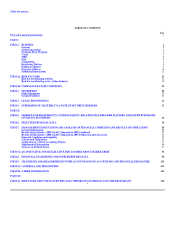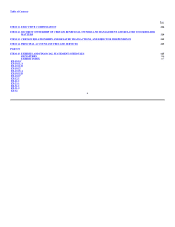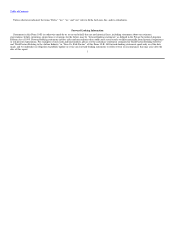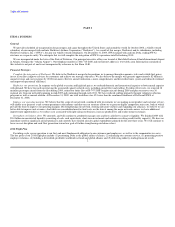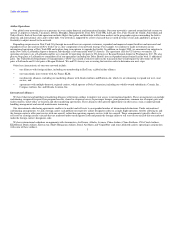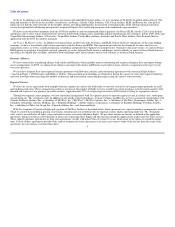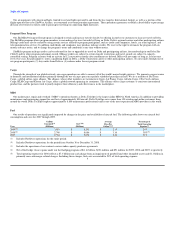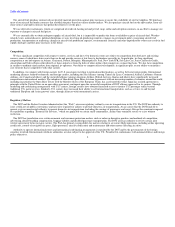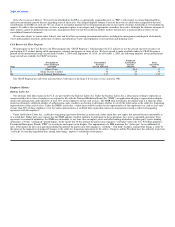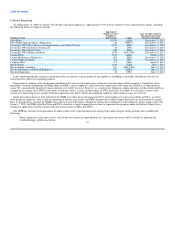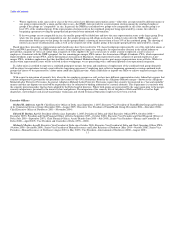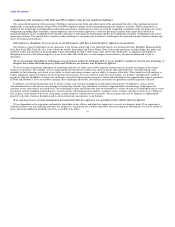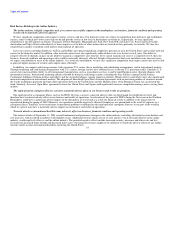Delta Airlines 2009 Annual Report Download - page 13
Download and view the complete annual report
Please find page 13 of the 2009 Delta Airlines annual report below. You can navigate through the pages in the report by either clicking on the pages listed below, or by using the keyword search tool below to find specific information within the annual report.
Table of Contents
Environmental Matters
Noise. The Airport Noise and Capacity Act of 1990 recognizes the rights of operators of airports with noise problems to implement local noise abatement
programs so long as such programs do not interfere unreasonably with interstate or foreign commerce or the national air transportation system. This statute
generally provides that local noise restrictions on Stage 3 aircraft first effective after October 1, 1990, require FAA approval. While we have had sufficient
scheduling flexibility to accommodate local noise restrictions in the past, our operations could be adversely impacted if locally-imposed regulations become
more restrictive or widespread.
Emissions. The U.S. Environmental Protection Agency (the "EPA") is authorized to regulate aircraft emissions and has historically implemented emissions
control standards previously adopted by the International Civil Aviation Organization ("ICAO"). Our aircraft comply with the existing EPA standards as
applicable by engine design date. ICAO has adopted additional aircraft engine emissions standards applicable to engines certified after December 31, 2007,
but the EPA has not yet proposed a rule that incorporates these new ICAO standards.
Concern about climate change and greenhouse gases may result in additional regulation of aircraft emissions in the U.S. and abroad. As a result, we may
become subject to taxes, charges or additional requirements to obtain permits or purchase allowances or emission credits for greenhouse gas emissions in
various jurisdictions, which could result in taxation or permitting requirements from multiple jurisdictions for the same operations. Ongoing discussions
between the United States and other nations, including the discussions that resulted in an accord reached at the United Nations Climate Change Conference
2009 in Copenhagen in December 2009, may lead to international treaties focusing on greenhouse gas emissions.
The European Union has adopted the most significant emissions regulatory system by publishing a directive requiring its member countries to implement
regulations including aviation in the European Union's emissions trading system ("ETS"). Under these regulations, any airline with flights originating or
landing in the European Union will be subject to the ETS and, beginning in 2012, may be required to purchase emissions allowances or credits if the airline
exceeds the number of free credits allocated to it under the ETS. We expect that such a system would impose significant costs on our operations in the
European Union. Under the ETS, each airline is required to file emissions plans with a specific member country. Prior to NWA ceasing existence as a separate
entity, we filed emissions plans in Germany (with respect to Delta) and the Netherlands (with respect to NWA) under protest. The Air Transport Association
and three U.S. carriers have filed an action in the United Kingdom challenging the legality of the ETS on various grounds; however, airlines will be required
to comply with the ETS unless interim relief is granted.
Cap and trade restrictions have also been proposed in the United States. In addition, other legislative or regulatory action, including by the EPA, to regulate
greenhouse gas emissions is possible. In particular, the EPA has found that greenhouse gases threaten the public health and welfare, which could result in
regulation of greenhouse gas emissions from aircraft. In the event that legislation or regulation is enacted in the U.S. or in the event similar legislation or
regulation is enacted in jurisdictions other than the European Union where we operate or where we may operate in the future, it could result in significant
costs for us and the airline industry. At this time, we cannot predict whether any such legislation or regulation would apportion costs between one or more
jurisdictions in which we operate flights. Under these systems, certain credits may be available to reduce the costs of permits in order to mitigate the impact of
such regulations on consumers, but we cannot predict whether we or the airline industry in general will have access to offsets or credits. We are monitoring
and evaluating the potential impact of such legislative and regulatory developments. In addition to direct costs, such regulation may have a greater effect on
the airline industry through increases in fuel costs that could result from fuel suppliers passing on increased costs that they incur under such a system.
We seek to minimize the impact of carbon emissions from our operations through reductions in our fuel consumption and other efforts. We have reduced
the fuel needs of our aircraft fleet through the retirement and replacement of certain elements of our fleet and with newer, more fuel efficient aircraft. In
addition, we have implemented fuel saving procedures in our flight and ground support operations that further reduce carbon emissions. We are also
supporting efforts to develop alternative fuels and efforts to modernize the air traffic control system in the U.S., as part of our efforts to reduce our emissions
and minimize our impact on the environment. 8



